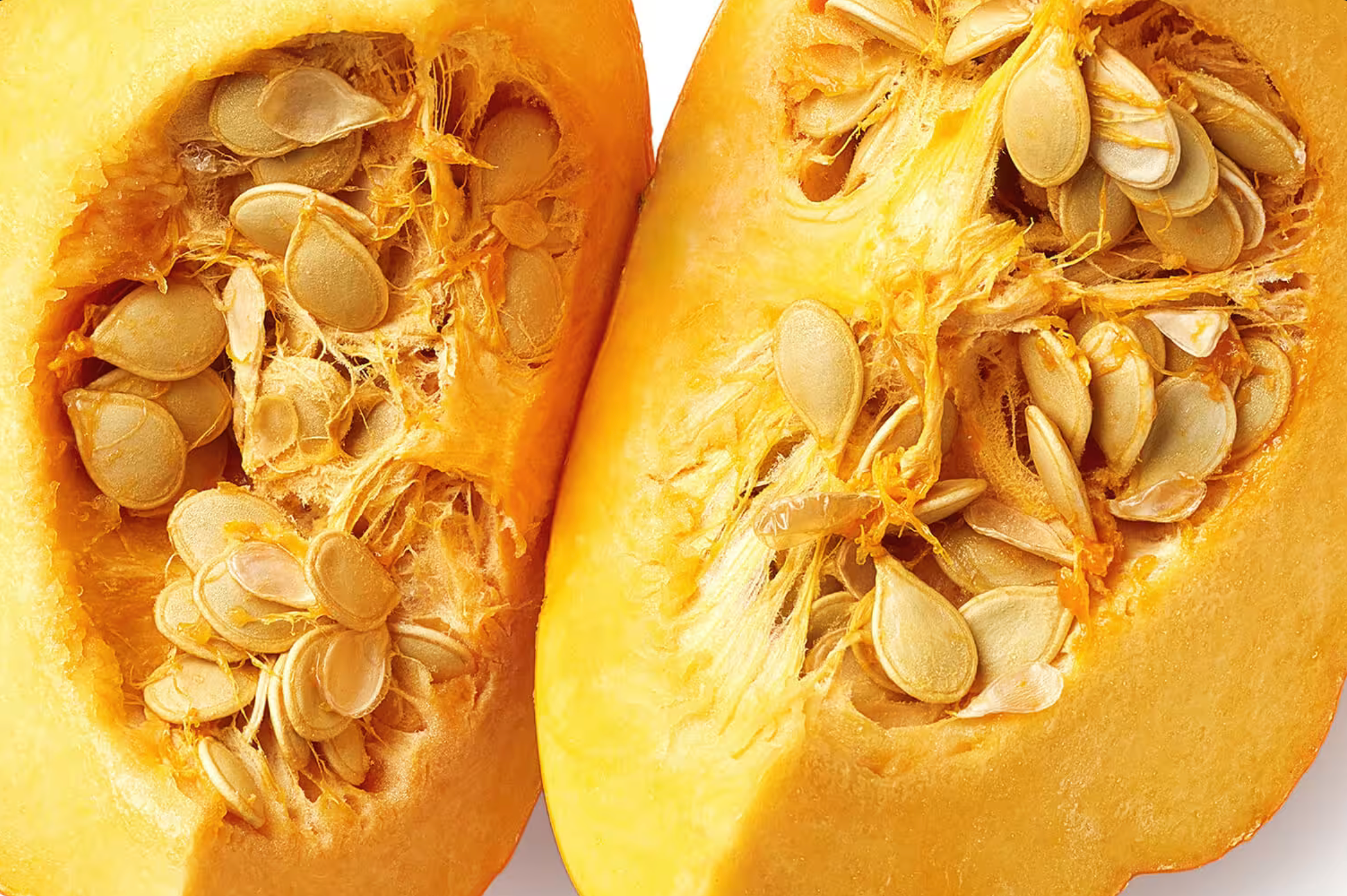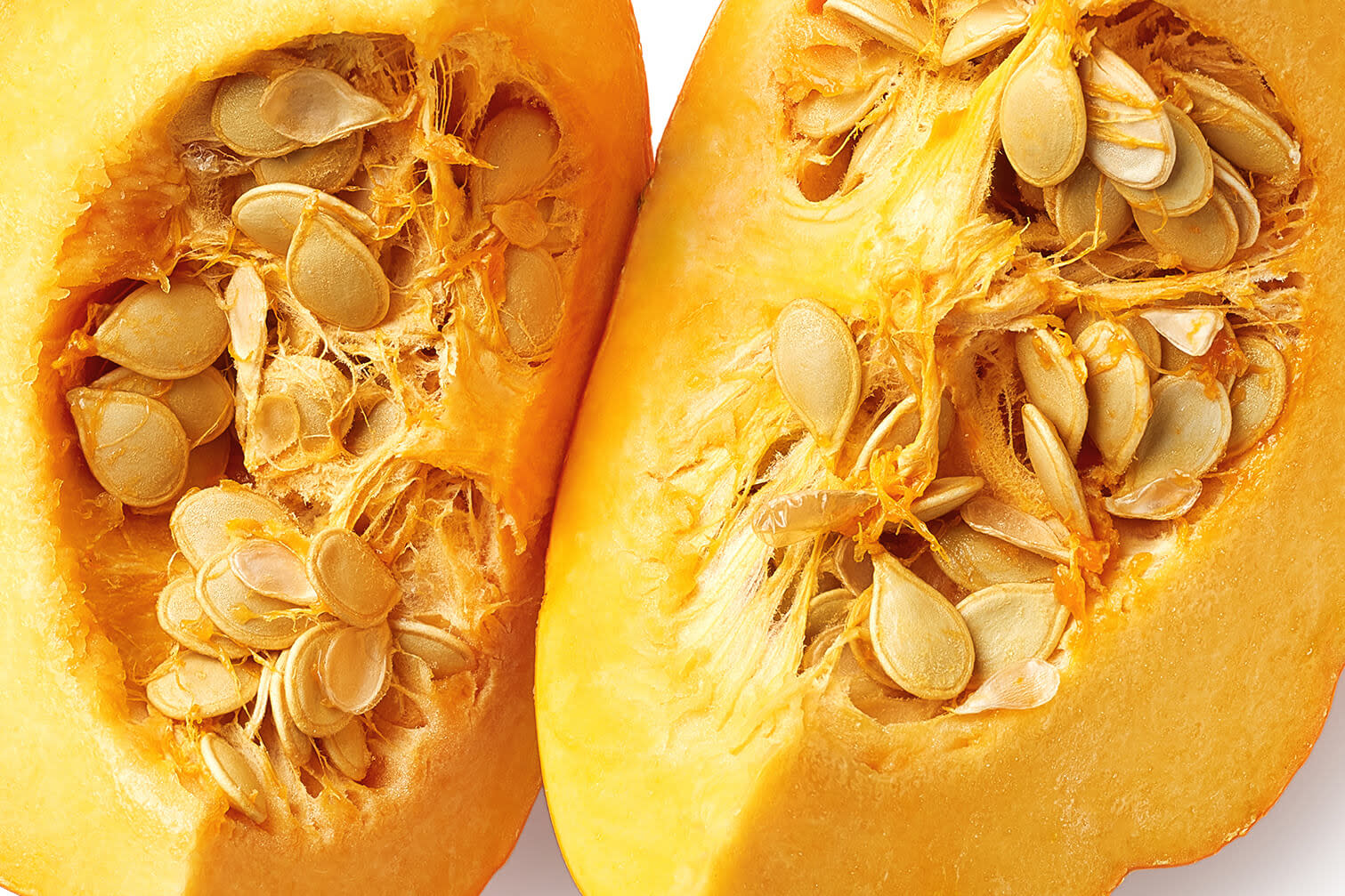
6 Key Benefits of Pumpkin Seeds (And How to Add More to Your Plate)
- By Lidey Heuck
- Updated: February 2024

When it comes to nutrition, pumpkin seeds pack a lot of bang for their buck. These tiny seeds are loaded with valuable nutrients that we need for health and wellbeing. Here are 4 key benefits of pumpkin seeds and tips for how to enjoy them in your day-to-day.
Macronutrients: we’re talking about protein, fats, and carbohydrates. Pumpkins seeds have a mix of them all. One ounce of pumpkin seeds gives you nearly nine grams of protein. That ounce of pumpkin seeds also has three grams of carbohydrates, two grams of which come as dietary fiber (hello, happy gut). But the real highlight of pumpkin seed macros is the mono- and polyunsaturated fats, aka the good types known to promote heart health.

Pumpkin seed nutrition doesn’t end with macronutrients: they’re a strong source of micronutrients too.
Let’s start with iron. A one-ounce serving of pumpkin seeds gets you about 14% of the daily value of this essential mineral. We need iron to help carry and store oxygen in the body and to make and repair DNA. Iron also plays an important role in energy metabolism.
Next up: zinc. Pumpkin seeds have a lot of it—one ounce gives you 2.21 mg of zinc---the daily value for zinc is 11mg (so that's 20% btw). This essential mineral plays a vital role in immune function, growth and development, vision, neurotransmission, and a whole lot more.
Pumpkin seeds are also loaded with copper, needed for energy production, central nervous system function, and gene regulation.
But wait, there’s more. Well, one more. The seeds also sneak in magnesium, a mineral involved in hundreds of metabolic reactions.
How to eat ‘em
Add them to salads for texture, sprinkle on soups (hello, butternut squash soup), they’re also great as a topping for stir fry and bowls.
Phenolics are compounds unique to plant foods. We don’t need them like we need macro and micronutrients (we won’t develop a deficiency without them), they just help kick our health up a notch. The ones found in pumpkin seeds can help keep cells healthy and protect against cell damage.
Pumpkin seeds are rich in nutrients that contribute to cardiovascular health, such as magnesium and antioxidants. Magnesium plays a crucial role in regulating blood pressure levels and preventing hypertension, while antioxidants in vitamin E and zinc protect the heart by reducing oxidative stress and inflammation, both of which are linked to heart disease (Source). Additionally, the unsaturated ("healthy") fats in pumpkin seeds are known to improve cholesterol levels, reducing LDL ("bad") cholesterol and lowering the risk for heart complications. (Source)
Pumpkin seeds are naturally abundant in magnesium and tryptophan, two nutrients linked to improved sleep. Research suggests magnesium may improve sleep duration and sleep quality. (Source) Tryptophan, an amino acid in pumpkin seeds, is also known for its sleep-promoting properties. One preliminary study found that daily intake of 1 gram of tryptophan significantly improved sleep quality, although more research is needed. (Source)
Sources

Lidey Heuck
Contributor
Lidey is a cook, writer, and creator based in New York’s Hudson Valley. She’s a recipe contributor to New York Times Cooking and the creator of Lidey Likes, where she shares easy, crowd-pleasing recipes and musings on home decor, entertaining and travel.
Delivery schedule will be updated based on the selected day and date
Save changes CancelYour subtotal must be above $50 for the box to ship. Add your replacement item(s) and then try deleting these again.

Acai + Cherry
Smoothie

Strawberry + Cashew
Smoothie

Banana + Almond
Smoothie

Passion Fruit + Greens
Smoothie

Dragon Fruit + Lime
Smoothie

Strawberry + Peach
Smoothie

Mint + Cacao
Smoothie

Blueberry + Cacao
Smoothie

Mango + Greens
Smoothie

Cherry + Almond
Smoothie

Sweet Potato + Wild Rice Hash
Harvest Bowl

Carrot + Cinnamon
Smoothie

Dragon Fruit + Lychee
Smoothie

Ginger + Greens
Smoothie

Date + Almond
Smoothie

Blueberry + Hemp
Smoothie

Broccoli + Cheeze
Harvest Bowl

Cold Brew + Almond
Smoothie

Spinach + Shiitake Grits
Harvest Bowl

Tomato Basil + Portobello Bolognese
Pasta

Pineapple + Matcha
Smoothie

Herbed Squash + Asparagus Risotto
Harvest Bowl

Strawberry + Goji Berry
Breakfast Bowl

White Bean + Spinach Pesto
Pasta

Apple + Cinnamon
Smoothie

Sage Wild Rice + Cauliflower
Grain

Artichoke + Spinach
Flatbread

Avocado + Greens
Smoothie

Apple + Cinnamon
Breakfast Bowl

Cold Brew + Cacao
Smoothie

Black Bean + Cheeze
Harvest Bowl

Tomato + Basil
Flatbread

Chickpea + Coconut Curry
Harvest Bowl

Brussels Sprouts + Tahini
Harvest Bowl

Cinnamon + Banana
Breakfast Bowl

Cauliflower Rice + Pesto
Harvest Bowl

Tomato + Zucchini Minestrone
Soup

Almond Satay Brussels Sprouts + Carrot
Harvest Bowl

Portobello + Pesto
Flatbread

Broccoli + Buckwheat Stir-Fry
Harvest Bowl

Lentil + Tomato Bolognese
Harvest Bowl

Red Lentil + Cumin
Harvest Bowl

Mulberry + Dragon Fruit
Breakfast Bowl

Black Sesame + Banana
Smoothie
Check out everything we have to offer, or start with a set of our customer favorites
Shop Best Sellers